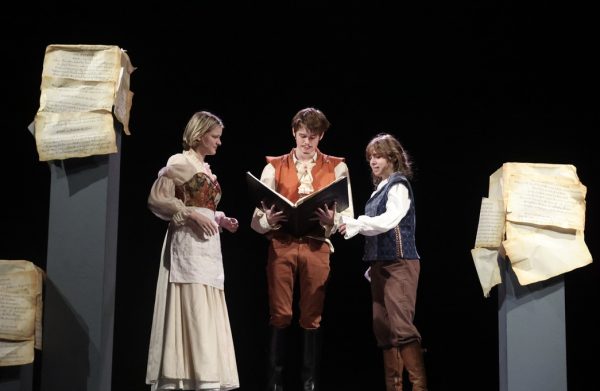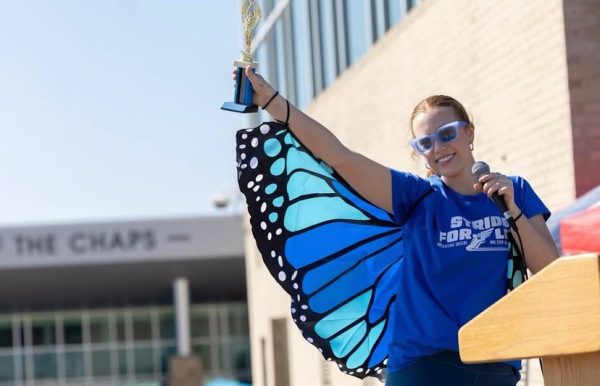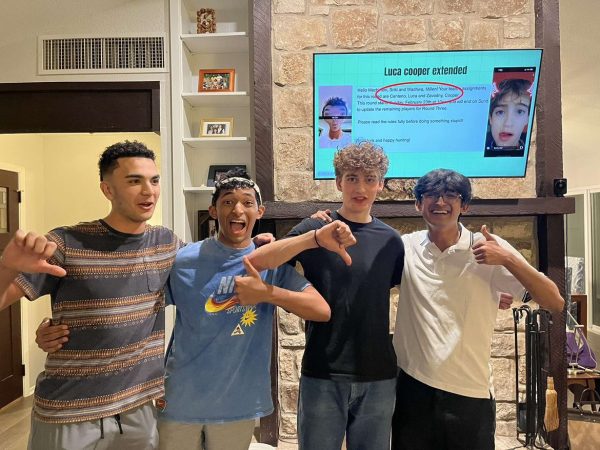Coaches in the classroom
Coach Shannon Haddon
Coach Haddon teaches Modified Biology, Peer Assistance for Students with Disabilities, and MAPS. She coaches girls’ basketball and assists in coaching softball.
The Featherduster: How different is it to coach athletes versus teaching students?
Haddon: When I’m a teacher, I’m a teacher. I know a lot of people call me ‘Coach Haddon,’ but I try to make sure that the majority of the days kids see me I’m dressed in teacher attire and not coach attire. At the same time, I try to maintain the same person. I don’t think my athletes would say I’m different in the classroom than in practice. In the classroom, I’m a teacher first. When I’m on the field or when I’m in the gym, then I’m a coach. But they’re still the same thing, right? I still have to teach the skills of the sport that I’m interacting with.
FD: Do you ever worry about accidentally being more lenient with athletes in the classroom when you know something is tough on the field or court?
Haddon: I try to get to know all of my students because, believe it or not, all students have stuff going on. You may not be involved in a UIL sport, you may not be involved in a UIL academic or theatrical or anything else. You may be involved in youth group. You may just have stuff going on at home. The bottom line: everybody’s got stuff. So, I always look at all my students under the assumption “you all got stuff.”
FD: Do you ever coach differently when you know your students have a big test?
Haddon: I may schedule a practice differently. In my opinion, anything the students are giving their effort to is valuable. So if a student is giving their effort to their academics and they’re splitting time with athletics, then they should get the best of both whenever they’re either present in class or present in practice. With that being said, though, if I’m aware that I’ve got a whole team of kids that are highly stressed, then we’ll acknowledge it, we’ll address it, and we’ll make a quality practice, but maybe we do it in a short amount of time. I will coach the practice the same way, but we may alter the time it starts and the time it ends.
FD: Is there anything else you want people to know?
Haddon: I do want to stress that I think it’s important that people understand, or at least try to understand, that if you’re a coach at the high school level, you have to be a teacher first. That does require a lot of thought, a lot of passion for what we do, because the student athletes have to be students first. Think about all the extra time before and after school that the student athletes dedicate to their craft. Teachers and coaches give that much time too. We’re blessed to have the opportunity to coach because we’re teachers first.
Coach Tony Salazar
Coach Salazar teaches health and coaches football.
FD: How different is it to coach athletes versus teaching students?
Salazar: I don’t think it’s too much different. For an athlete, especially in my class, I think it’s a little tougher for them because I expect them to kind of set the example of what an exceptional student should be like at Westlake High School. I expect them to sit at the front of the classroom, to be on time, to be engaged in the activities and learning and turn in quality work. If I can use those student athletes to start the mold of what I want the whole classroom to be, I think I’m ahead of the curve. I can get everyone else to jump on board and understand what it’s going to take to be successful in a classroom.
FD: Do you ever use teaching skills on the field/court or use teaching skills in the classroom?
Salazar: They’re one in the same to me. We are teaching our student athletes the skills and the opponent’s offensive and defensive philosophies for us to be able to line up. We’re teaching them how to compete and be motivated and to work for each other. We’re teaching them how to balance responsibilities. So, those are the same things I stress in the classroom. Make sure things get turned in on time, make sure it’s outstanding work, and make sure that you’re an exemplary student in the classroom and the community of Westlake.
FD: How do you balance time when you get home so late from a game only to go to school early the next morning and teach?
Salazar: Sometimes there’s not much time left and you simply have to be committed to both your jobs as a teacher, first, and your job as a coach second. It’s a matter of just using your time efficiently and wisely. Whenever you have downtime, there’s always something to do, and there’s not much time to sit around and twiddle your thumbs or search the Internet or play on your phone.
Coach Katie Hensle
Coach Hensle teaches U.S. History and coaches girls’ basketball.
FD: Is it easier on some days to be in one environment versus another?
Hensle: Any coach would tell you that when you’re in season, it would be much easier to be in just one or the other. I think it’s really hard when you’re trying to make sure that you’re doing everything you can to help your athletes and you’re doing everything you can to help your students. And of course all of us have families and lives on the outside. So balancing all three of those things and doing your best at all three of those things, especially when you’re in season, is certainly a challenge. You really have to be organized and you really have to be able to prioritize what needs to be done first to stay on top of it all.
FD: What are different coaching and teaching skills?
Hensle: I think you try to be approachable so that the kids know, when they’re in your classroom or if they’re an athlete, that if they’re having a problem in your class or in basketball, or even outside of that, that they can come to you. I think you try to be a good communicator so they know what to expect. They need to know when quizzes are and they need to know what’s expected of them in practice. All those things are sort of the same, and then I think it’s also important that you do everything you can to get to know them as best you can on a personal level.
FD: How do you balance time when you have to get home late from a game only to be teaching early the next morning?
Hensle: I try to be ahead, just like I tell my students. If you have a big game on Tuesday
night and we have a test on Wednesday, you need to study on Sunday and Monday. I try to do the same thing so that, going into that situation, Wednesday is ready. Before Tuesday ever starts I’m ready for Wednesday. Even with things as small as making sure papers are copied.
FD: Anything else you would like to add?
Hensle: People don’t always appreciate how hard it is. And I don’t know that it’s always the actual time put in. I think that one thing people don’t realize about being a coach and a teacher, especially if you’re also a parent, is that you emotionally want to help and be invested in all of your kids. That’s probably the hardest part: my emotional energy isn’t only given to one of those three groups and I have to make sure that I’m who I need to be for all of those three groups.
Coach Alison Soelter
Coach Soelter teaches Pre-AP and AP Computer Science and is the head girls’ swimming coach.
FD: When you were younger, did you envision yourself teaching and/or coaching?
Soelter: Absolutely not, actually. I swam, then I went to Olympic trials in high school and then went to Texas and swam. I got my major in exercise science, and I swore I’d never coach. Just because of the amount of time you put into it. I also didn’t think I would teach. But then, a couple years out of college, all of that changed. I started coaching and ended up loving it. Then coaching led to teaching and coaching. Now I love it.
FD: Do you ever use teaching skills while you’re coaching or use your coaching skills when you’re teaching?
Soelter: I use my coaching skills more while I’m teaching. Being very personable with the students, creating a fun learning environment, getting to know them so that they can learn the material the best they can. Just like in swimming, they have the four strokes, but based on each person, we have to tweak the stroke to fit their body. It’s the same thing that I have to do in the classroom. I have to tweak the material to that person and how they learn. I use a lot of what I learned with my coaching in the classroom to help them learn and find out what it is they love.
FD: How do you balance time when you get home so late from a meet and have to come teach the next morning?
Soelter: You can be pretty tired, but I did get a lot of practice in college competing and going to school. I spent the majority of my life having a full schedule, so I’m used to that. My first period can sometimes be pretty entertaining because I’m still trying to wake up. I’m just used to it. It’s part of the job and I wouldn’t have it any other way. I’d rather have the job and be able to coach and have the late nights than not have it.
FD: Do you ever worry about accidentally being more lenient with athletes in the classroom when you know something is tough because you’re their coach?
Soelter: Absolutely not. If a student came to me and there’s a serious family issue going on, I will work with them, but as far as my swimmers go, they do not get any favor compared to my other students. I expect them to do exactly what my other students do. If they’re tired, they’re tired. Every student in this high school is tired. No favorites or anything like that.
Coach J.T. Blair
Coach Blair teachers World Geography and coaches football and baseball.
FD: Is it easier on some days to be in one environment versus another?
Blair: I think the balance of both of them is what I really like about the job. I think that if I was on the field all day, I’d want to spend more time in the classroom. If I was in the classroom all day, I’d want to spend more time on the field. So I really think the balance is perfect. That’s part of the reason this is a good job.
FD: What is it like when you have a student in one of your regular classes and in a sport? Blair: You know, sometimes I have higher expectations for the athletes. Which is probably unfair, but I want them to sit on the front row. I want them to be involved in class. I want them to be leaders in the classroom. We ask a lot of the student athletes, but at the same time I want my athletes to set examples.
FD: Do you ever purposefully give less homework on important sports days?
Blair: No, but you’re aware of it. I think that part of being a good teacher or a good coach is to be aware of important tests, important dates, where you know our student athletes have to put extra time in. I wouldn’t have a late practice the day before the PSAT, you know? Stuff like that.
FD: Is there anything else you’d like to add?
Blair: Ninety percent of my paycheck comes from teaching. Ten percent of it comes from coaching. So, where does that place the importance? In the classroom. And I learned that because I had a dad that was a coach and a mom that was a principal.
Coach James Baker
Coach Baker teaches Pre-AP English 1 and coaches boys’ soccer.
FD: Do you prefer being on the field or being in the classroom?
Baker: I got into teaching to be a teacher. Coaching is something I really enjoy, but it’s always been a product of being a teacher first. I’m a firm believer that the best coaches are the best teachers. You have an ability to get the best out of your students, just like you have an ability to get the best out of your athletes. But a lot of coaching, in reality, is teaching. I’m not teaching them to win a game, I’m teaching them to be better people.
FD: What are different coaching and teaching skills?
Baker: They overlap quite a bit. The main ones I would attribute to things like motivation, making sure kids are motivated in works on the field and works in the classroom. Teaching them respect for themselves and other people, their opponents and other people in the classroom. Being prepared is probably one of the biggest traits that a coach can have both on the field and in the classroom.
FD: Do you ever worry about accidentally being more lenient with athletes in the classroom when you know something is tough for them in their personal life?
Baker: I wouldn’t say that I would be more lenient on them. I might be a bit more empathetic towards any of my students who are having issues. I think that’s one of the better traits we could have as teachers: understanding what our students are going through, regardless of if they’re in a sport or not, and making choices inside the classroom that are for the best interest of them and their situations that they’re going through.
FD: How different is it to coach athletes versus teaching students?
Baker: I don’t really think it is that different. There are different skills. In the classroom, you’re teaching kids skills they’re going to use to work around obstacles in learning. When you’re out on the field, you’re teaching them skills to overcome obstacles on the field. So it’s a matter of just making sure that you’re reaching kids in a way that they’re able to recognize the skills that you’re trying to give them and they’ll find success.





